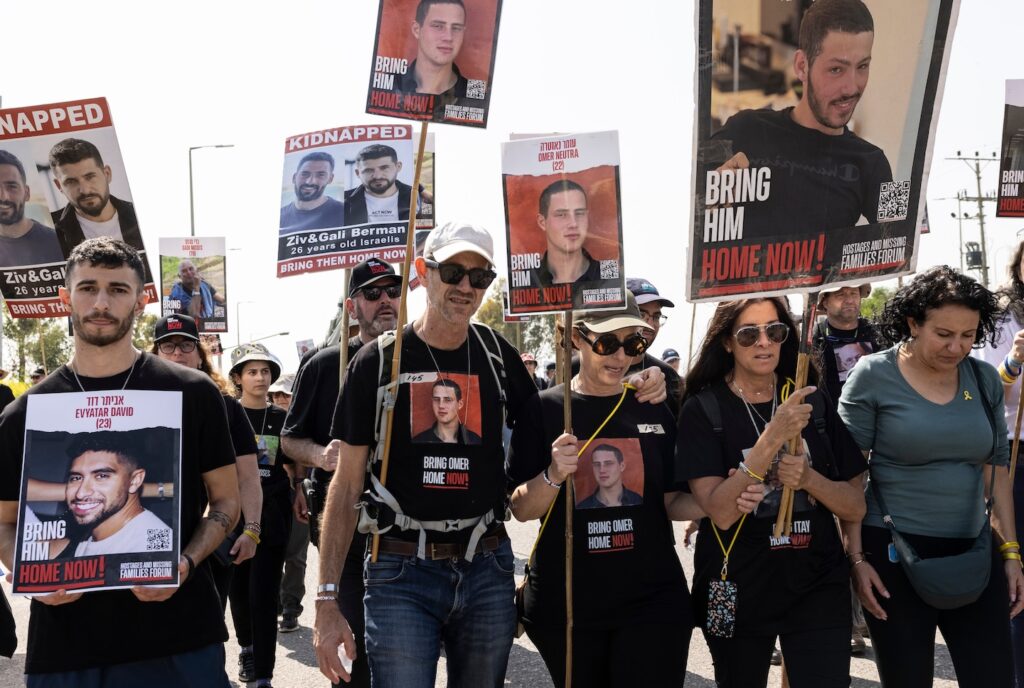The hostages held by Hamas in Gaza — those still hoping to survive, and those killed but whose bodies remain — are not just an Israeli tragedy. They are an American tragedy, too, for a simple but often forgotten reason: eight of them, five alive and three dead, are American.
We cannot forget them, any more than we can forget Evan Gershkovich, who is imprisoned in Vladimir Putin's Russia, or Austin Tice, who has been held captive in Syria for more than a decade. They are American citizens, and we have a fundamental obligation to protect them.
But unfortunately, we forget. In Israel, the hostages are everywhere, their faces on posters pleading and demanding, “Let them come home.” In this country, the hostages, even the American hostages, are largely forgotten outside of synagogues and Jewish communities.
Last week, I met with the families of three hostages, who have been in captivity for 243 days. Edan Alexander, a 20-year-old from Tenafly, New Jersey, was a high school graduate who volunteered to serve in the Israel Defense Forces and was guarding a kibbutz near Gaza when he was kidnapped. Omer Neutra, a 22-year-old Knicks fan from Long Island, was a tank commander near Gaza before being captured during a Hamas attack.
 Follow this author Ruth Marcus' opinion
Follow this author Ruth Marcus' opinion
Judy Weinstein, a haiku-writing special needs teacher, mother of four and grandmother of seven, was murdered along with her husband, Gad Hagai, during an early morning walk in the Nir Oz kibbutz. For weeks it was believed the couple had been taken alive, but their children and Judy's 95-year-old mother cannot hold shiva, a traditional Jewish mourning ritual, until their bodies are returned.
Over the years, I have met other families facing terrible situations: the mother whose child was shot at Sandy Hook Elementary School, the wife of an American contractor imprisoned in Cuba. I don't want to rank the tragedies, but there was something particularly disturbing about the heartbroken faces of the hostage families, who don't know every day if their loved ones are still alive or how long their hellish captivity will last. The bleak news last week that four more hostages were confirmed dead only adds to the excruciating anxiety. The news that four hostages were rescued alive on Saturday is cause for celebration, but it's also testament to the rollercoaster reality these families are enduring, the deals that leave them in limbo.
Of course, “hellish” applies to the ongoing war in Gaza itself. The deaths and suffering of innocent civilians are tragic. As President Biden said, “It's time to end this war.” But it should be possible to keep the focus on the horrors of both. Hostages, especially American hostages, are noticeably absent from the American public consciousness.
Families say the Biden Administration has been responsive and attentive from the get-go, but that's not true. The day before our meeting, they met with National Security Advisor Jake Sullivan, their ninth since October 7. Sullivan was preparing to leave with the president later that day for the 80th anniversary of the Normandy landings. They met twice with Biden himself, once by Zoom call and once in person. They visited CIA Headquarters and met with Director William J. Burns.
Still, they insist the true measure of their commitment is tangible results: “We know it's enough when our loved ones come home,” says Judy's sister, Andrea Weinstein.
They have been less tolerant of Israeli Prime Minister Benjamin Netanyahu and the U.S. congressional leaders who invited him to address a joint session of Congress. “It's totally inappropriate right now” while the hostages remain, said Edan's father, Adi Alexander.
But above all, they're sending a message to the American people: don't forget us. “The story that's not told enough is that this was an attack on America, and not just Israel, but citizens of 24 states,” said Omer's mother, Orna Neutra. “And more specifically, 44 Americans were killed on October 7th, 12 were taken hostage, and eight are still being held hostage. I think that's been forgotten.”
I asked them why they thought this was happening. “I personally have doubts, but I think part of it is because these Americans have dual citizenship and are perceived as more Israeli than American,” Omer’s father, Ronen Neutra, told me. “So maybe… it’s not as important.”
Adi Alexander, in his words “a bit bold,” quoted Rep. Dan Goldman (D-N.Y.) as saying that Americans who have been killed or taken hostage “are not mentioned enough simply because they are Jewish.”
Whatever the reason, the consequences are horrifying. “If the United States were to allow American hostages to rot in Gaza, my fear would be [is] “And the fear that everyone should have is that this will prove to be an effective terrorist strategy,” Ronen Neutra said, “and just as it happened in our country with 9/11, this will continue to happen.”



